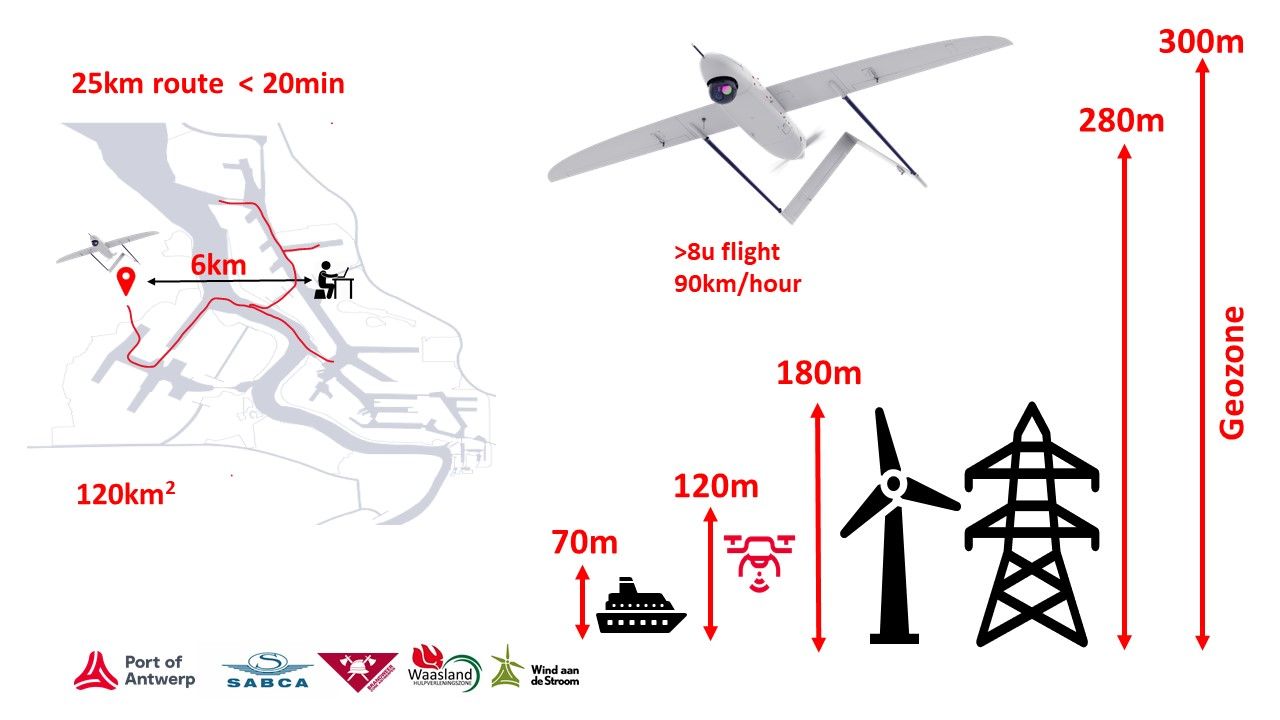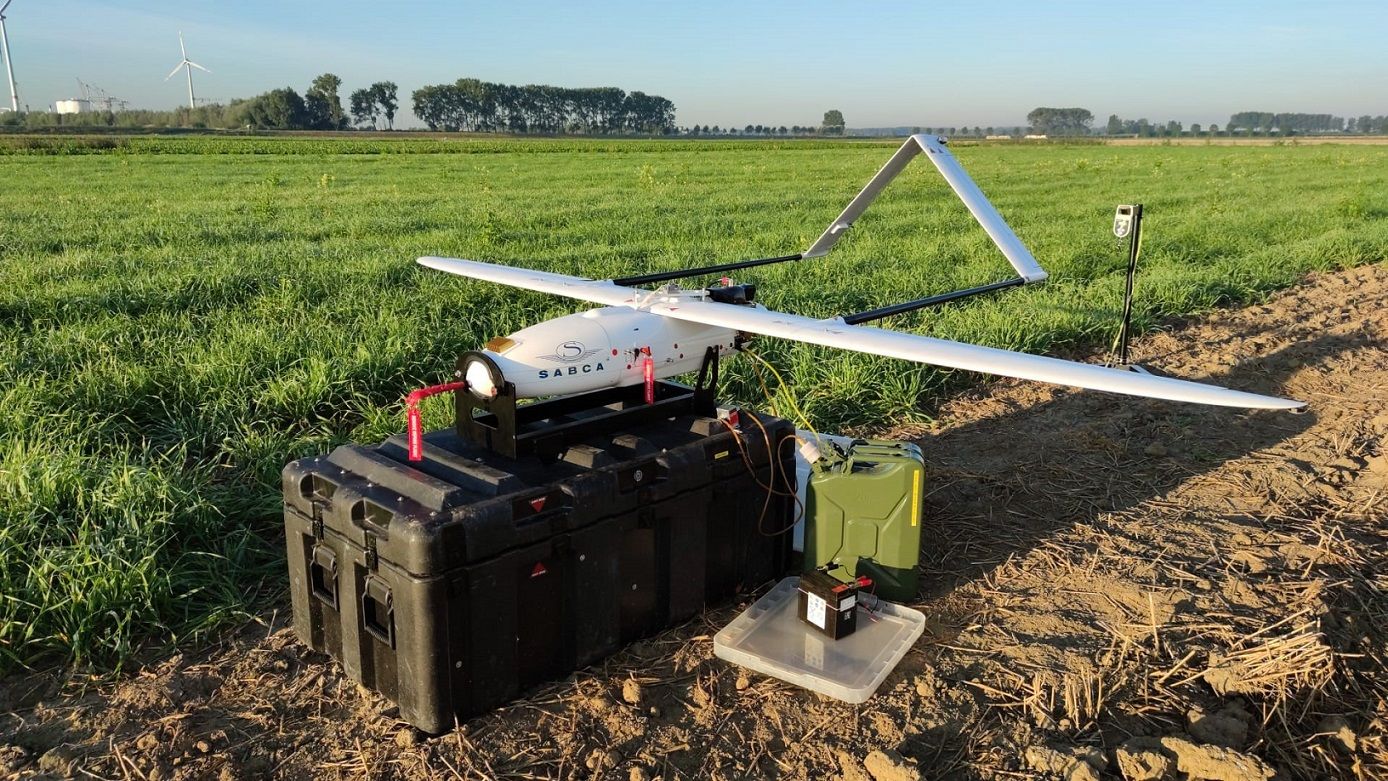Port of Antwerp carries out unique trials of small, unmanned aircraft (‘fixed-wing drones’)
Drones are playing an increasingly important role in coordinating safety within the complex port environment. That is the reason why Port of Antwerp carried out unique trials involving a ‘fixed-wing’ drone this week. The fact it can fly at high altitude and has a very powerful camera enables the craft to provide an unprecedented view of the entire port. In cooperation with Port of Antwerp's safety partners and its technology partner Sabca, the unmanned aircraft was used to provide images of realistic incident scenarios. The trials are intended to provide an insight into the possibilities this type of drone can provide as a tool to assist the port authority and to make collaboration with the safety and security services more efficient.
A unique perspective
The port of Antwerp is over 120 km² in size and forms part of Belgium's ‘critical’ infrastructure. Thanks to the unique views they provide from the air, drones can make a significant contribution to overall safety within this complex environment. A ‘fixed-wing’ drone can fly around for more than eight hours and take pictures with a very powerful camera (30x zoom) from a height of 280 metres. This week, in collaboration with Waasland Emergency Assistance Zone, the Antwerp Fire Service and Port of Antwerp's technology partner, Sabca, Port of Antwerp tested out various use cases. The images recorded by the unmanned aircraft of four realistic emergency situations (a container fire, the rescue of a person in distress on top of a windmill, the rescue of a drowning person and the rescue of a man overboard), will provide an insight into the possibilities of using unmanned aircraft of that sort within the port environment.
Working together to build the port of the future
According to Port of Antwerp, the use of drones will play an increasingly important role in the port of the future and as a means of maintaining safety. Cooperation with innovative partners such as the aviation specialist Sabca will form a key part of this.
“Drones will be indispensable in the near future when performing high-risk tasks,” says Thibauld Jongen, the CEO of Sabca, “By carrying out these demonstrations in collaboration with Port of Antwerp, we are able to show that we can make various operations safer and more efficient by using unmanned aircraft for inspections, transporting goods and surveillance. Sabca is a specialist when it comes to carrying out complex assignments such as these, in which different partners cooperate with each other. We ensure that all systems are perfectly integrated so that the drones can collect and pass on the right information. We also use this expertise for other projects such as the automatic transportation of medical samples between hospitals, carrying out inspections of wind turbines at sea, measuring radiation at industrial sites and conducting surveillance assignments off the Belgian coast. By undertaking this joint exercise, Port of Antwerp is once again showing itself to be an innovative player that always seeks to play a pioneering role. We are therefore also grateful that Port of Antwerp decided to work with Sabca, a company also based in Belgium, in order to conduct these trials.”

Efficient collaboration with safety partners
In the future, Port of Antwerp intends to maximise the assistance provided to the Harbour Safety & Security (HSS) service and its safety partners through the use of drones. The types of tasks that can be performed include inspecting infrastructure, surveillance and monitoring, incident management, berth management and the detection of oil spills or floating waste.
The trials using the fixed-wing drone were carried out in close cooperation with the port's safety partners so that the experience gained in incident management can lead to even more efficient collaboration.
Bob Spanoghe from Port of Antwerp explains: “Given the huge surface area of the port, drones provide us with leverage when it comes to carrying out our core tasks as a port authority. Our goal is to put in place an operational network of drones by 2022 in order to provide a 'live feed' of the various port activities. As a tool, this will enhance the work carried out by the entire port community. That will enable us to have a more accurate sense of what is going on within the port and as we work towards the achievement of a safe, efficient and smart port – the port of the future. This the first time that trials using this fixed-wing drone have been undertaken in a port environment and they have helped us progress yet another step further, including in the collaboration we have achieved with our safety partners.”
Annick De Ridder, Port Alderman: “We are pulling out all the stops for a safe port and drones will become indispensable for this in the near future, also in our port. Innovation and digitalisation are crucial to guarantee sustainable growth in the long term. The port authority is therefore the driving force behind inventing and realising solutions for the challenges of tomorrow. Moreover, the port is an ideal environment to test and further develop this innovative technology.”
